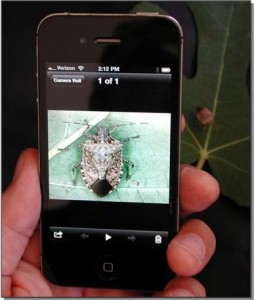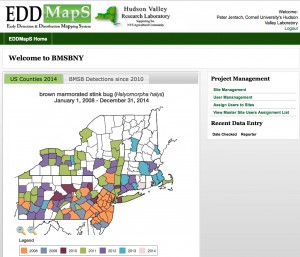 Since 2008, we have seen increasing populations of Brown Marmorated Stink Bug (BMSB) in the urban environment. Over the past 5 years our Citizen Science surveys suggest the greatest increase in population level are coming from the Hudson Valley and Central NY (Syracuse). Data provided by homeowner response to a 2013 citizen science project query indicated that the majority of respondents ‘are seeing more BMSB in their homes’. The EDDMapS is used to indicate the presence of the insect in NY State in both the urban and agricultural landscape (shown below; not yet live and still being tested).
Since 2008, we have seen increasing populations of Brown Marmorated Stink Bug (BMSB) in the urban environment. Over the past 5 years our Citizen Science surveys suggest the greatest increase in population level are coming from the Hudson Valley and Central NY (Syracuse). Data provided by homeowner response to a 2013 citizen science project query indicated that the majority of respondents ‘are seeing more BMSB in their homes’. The EDDMapS is used to indicate the presence of the insect in NY State in both the urban and agricultural landscape (shown below; not yet live and still being tested).
Although the insect is well know in the region as an urban pest, studies conducted in the Mid-Atlantic in 2012 have shown BMSB populations dwell and overwinter predominately in deciduous tree species in the forest, along the hedgerow, and in isolated pockets of wooded landscape. With warming temperatures, flowering trees have begun producing fruit, and BMSB will begin mating and laying eggs on foliage of deciduous trees to give rise to the first of two generations in the Hudson Valley. In 2012-13 we observed the first eggs on the 1st of June in an invasive tree known as Tree of Heaven, Ailanthus altissima, in Warwick, NY.
One of our research objectives this season is to test a trapping threshold to time insecticides to control BMSB. The threshold will employ Tedders Traps, combination lures and a threshold value of 40 BMSB per week, based on Tracy Leskey’s studies at the USDA-ARS in Kerneysville, WV. This season we have farm trap placements along the orchard edge locations in three counties (Orange, Ulster and Dutchess), which have captured relatively low numbers of BMSB since the 12th of May. Marlboro has traditionally had the highest trap numbers with this year being no exception. Below are the dates and trap numbers of five locations to give you an idea of populations across farms in the region.
We have not observed BMSB in tree fruit or vegetable commodities yet this season.
We will be sending out alerts as the insect moves into crops as we have in years past (see BMSB Alerts).


